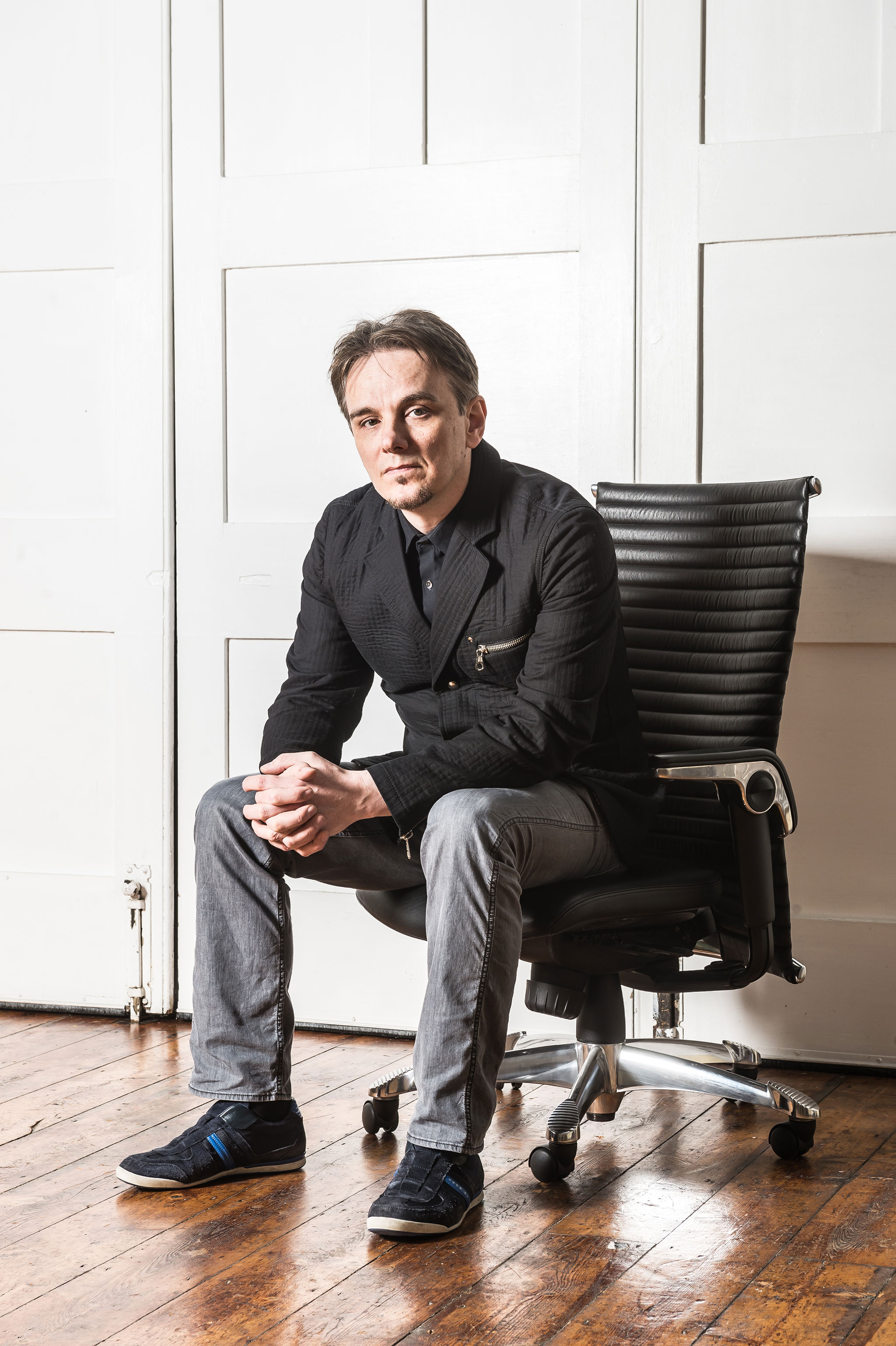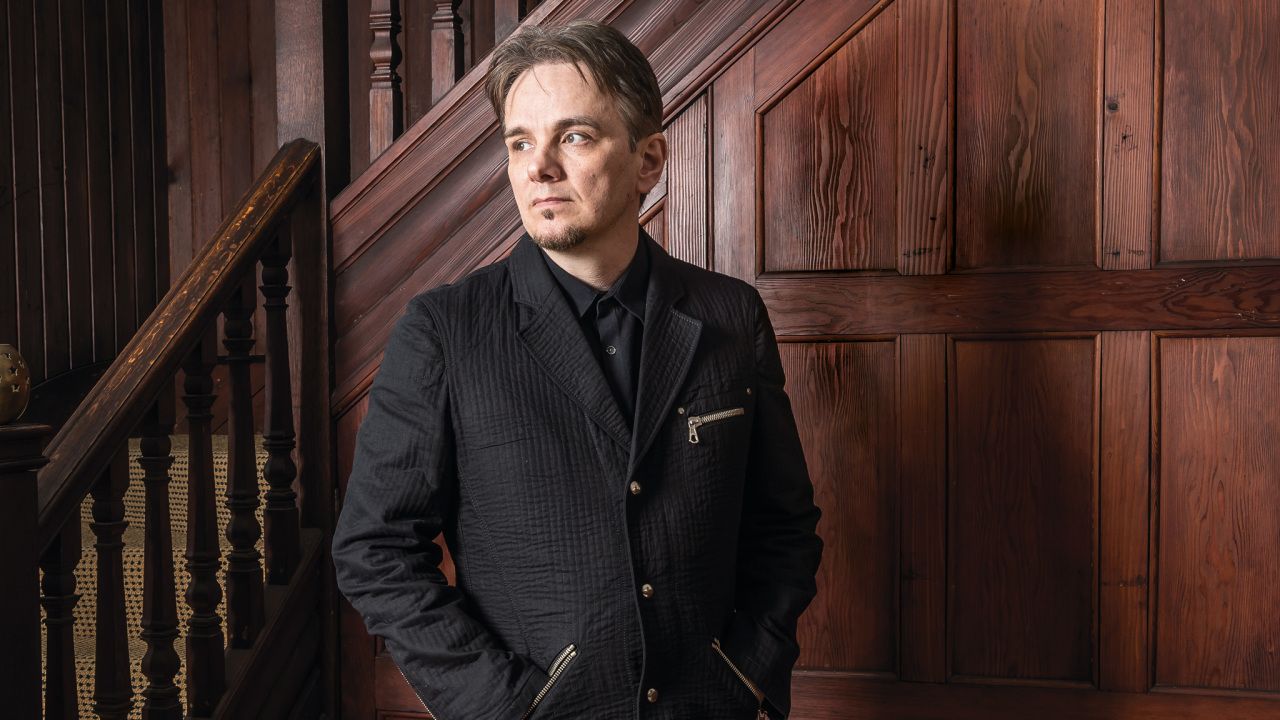Gavin Harrison, who has contributed to some of the pinnacles of progressive music in recent years, is used to playing in big bands. Right now however, he’s waxing evangelical about big band music.
He recalls his youthful introduction to it. “My dad was a trumpet player, and when I was eight or nine he took me to a gig at the BBC studios at Maida Vale. Because I was little I was allowed to sit down next to the drummer, and I heard this huge sound, all around me. Such an impact! So I’ve loved it all my life.
“Now I didn’t play much jazz to start with, because when you’re working as a drummer you drift into groups. Plus, that level of complexity requires a musician of some maturity, a good reader, with experience. Many big bands wouldn’t want a teenage kid playing… despite what the film Whiplash might tell you. So my intention with this record was to mix things up, push the musical boundaries. Boundaries are bullshit. I don’t like genres, borders, fences…we’ve got enough borders in the world.”
Gavin is discussing his ambitious new album, Cheating The Polygraph, which will confuse, bedazzle and ultimately blow people away. He’s best known for his work as drummer with Porcupine Tree and King Crimson, though his eclectic CV over an impressive 35-year career includes stints with everyone from Iggy Pop to Renaissance to Kevin Ayers; from Bowie bassist Gail Ann Dorsey to 2-step garage act Artful Dodger.
The Harrow-born virtuoso has created what might loosely be called a big band jazz album. Yet, just to twist things around further, he’s done this not by playing jazz standards or by rustling up new genre-pastiche jams, but by re-imagining eight Porcupine Tree songs in said style – and not the ones you might expect.
“An awful lot of work has gone into this. It’s taken five years, really. We built it track by track, from the foundations up. Each track took months, to-ing and fro-ing with the arrangements. I’d listened to the Porcupine Tree songs, thinking, ‘How could I adapt this?’ There were another eight or 10 that I started with that were abandoned. So there are rare B-sides like So Called Friend, Mother And Child Divided and What Happens Now? from an EP. It’s not just the most popular or obvious.” What his ensemble have done with The Pills I’m Taking (from Anesthetize) has to be heard to be believed.
“I wanted it to make sense as an entity to people who don’t even know Porcupine Tree,” he explains. “Most of the players on it weren’t familiar with the band’s music. When I played the originals afterwards, they couldn’t believe it. These aren’t just ‘covers’. You have maybe a clarinet where there was a guitar, a trombone where Steven’s [Wilson] voice was… I want people to open their minds.”

The album requires a leap of faith from fans of both Porcupine Tree and Gavin’s own diverse body of work. His grand-scale pet project invites you to embrace a new language. “You need a big idea,” he states, enthused. “I first asked Laurence Cottle [jazz-fusion bassist who’s played with Alan Parsons Project and Bill Bruford] to arrange Futile – possibly the most heavy metal thing we ever did as Porcupine Tree – and that worked so well as a complete opposite. A good album has a theme, which isn’t the same as a concept – there are no lyrics here. And if I hadn’t done Porcupine Tree songs, Prog wouldn’t be talking to me now.”
That’s debatable. By any standards, it’s exploratory, out-there music, and often sounds like scores to strange films not yet made, so it succeeds on its own terms. You might not know much about jazz but Cheating The Polygraph rings true on every level.
“OK, but I figured maybe the prog rock fraternity wouldn’t have been so interested. If you keep an open mind, there’s a lot to hit you. The phrase ‘big band’ sends shudders through some people, gives them an image of Glenn Miller. The genre can dictate what people think before they’ve heard it. If you don’t recognise a genre’s strengths, you’ve got nothing good to compare the music to. For example, if you hear something and it calls to mind Steely Dan or ELP or 70s Genesis, your mind might instinctively tell you, you’re going to like this, whatever it is. Whereas if you’re going, ‘Oh, God, I’ve never heard anything like this…’ you can be scared off.
“I remember hearing the National Bulgarian Female Choir, back in the 80s, and it blew the top of my head off,” Harrison continues. “No drums, I didn’t understand the language, but it stunned me like a sledgehammer. And it being foreign to me only added to how much I fell in love with it. It sounded like nothing I’d grown up with, and that moved me to tears. Now as it happens I did grow up with big band music, but for many this’ll be like hearing Japanese for the first time…”
It’s the crossover between big band and prog which is the extra curveball though. It’s not like that’s done every day. Harrison agrees. “I hope people can see past labels. Obviously my association with two big prog bands in Porcupine Tree and King Crimson tags me. But music should be free to cross those borders we were talking about. A genre is a great excuse for somebody to ignore your life’s work. ‘Oh, I once heard a Pink Floyd album I didn’t like, so I’m not going to like a Gavin Harrison album…’ Wrong! Nobody ever labelled me ‘garage dubstep’ after I worked with Artful Dodger.”
Everything he’s ever done across the spectrum of music has coloured this record, Gavin reckons. He can hear the last 35 years of his life in it.
“It’s not like I’m playing Iggy Pop rhythms anywhere, but every job you do changes and influences you in some way, even if subconsciously. Every choice you make affects your life in some small or large way.”
This complex, cinematic music needs fantastic players such as renowned jazz saxophonist Nigel Hitchcock. “A handful of guys in a grunge band couldn’t pull it off,” admits Harrison. “And a lot of albums now sound like they were made in three weeks in a bedroom with a synth and a drum machine. Don’t get me wrong, that can have value – I’m a huge fan of The Blue Nile, for example. But this… fills the room.”
The artwork, which shows Harrison blinded by light, is intentionally striking. “Because it’s about listening. Don’t get distracted by your eyes with the computer screen. This is foreground music, not background music while you’re on Facebook or Twitter. Close your eyes and feel it. Let it create images in your mind. An album should be more than entertainment – it should hold your attention. Like the first time I heard Frank Zappa’s Hot Rats or Joe’s Garage - the way I experienced the world was changed.”
But can we ever recapture the unadulterated lost-in-music feelings of our youth? Don’t the years, and familiarity, shave off a certain edge?
“I’d agree that between the ages of, say, 14 and 20, music shapes you, and I still get excited when something from that period pops up on my iPod. I still feel the things I felt then. But part of that’s akin to the glow of nostalgia you feel when you see Ford Capris or Gola trainers. Re-living your childhood. For me, part of the reason for doing this album is recalling that eight-year-old I was when this music enveloped me – so loud and primitive and powerful.
“You always want your parents’ approval on some subtle level,” he adds. “My parents were always very supportive, and they’d have liked this more than anything I’ve ever done. I remember when I was playing with Iggy, and my mum said, ‘Oh, shall we come?” And I said, ‘Oh, I don’t think you’d like it’… Ha ha. The thing is, if she had come, she’d have said, ‘That was lovely!’ regardless.”
It’s unlikely Harrison will be touring Cheating The Polygraph, as live performances would require personnel and rehearsals on a par with the building of the Taj Mahal, but, he adds wistfully, it’s “not impossible”.
Meanwhile he’s busy touring with King Crimson later this year. Harrison finds that experience “creative and open-minded, there’s nothing you can’t do. It’s my dream brief! Often, as a drummer, particularly when you start out, you’re used to people saying, ‘No fills, keep it tight…’ This, the polar opposite, was quite scary at first. Robert Fripp said, ‘I’ll accept anything except the mundane.’”
That’s a mantra Gavin holds dear. “If you’re a Porcupine Tree fan who’s never heard any jazz outside your dad’s record collection from decades ago, let me tell you, it doesn’t all sound the same! This is not the theme tune to Parkinson. This is deep!”
Cheating The Polygraph is out now on Kscope. See www.gavharrison.com for more information.

